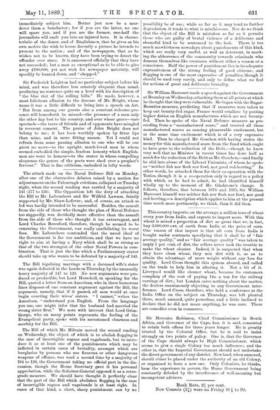The Bill of which Mr. Milvain moved the second reading
on Wednesday, the object of which is to abolish flogging in the case of incorrigible rogues and vagabonds, but to intro- duce it as at least one of the punishments which may be inflicted in certain cases of brutality, amongst which are burglaries by persons who use firearms or other dangerous weapons of offence, was read a second time by a majority of 194 to 126, the Government taking no official part in the dis- cussion, though the Home Secretary gave it his personal approbation, while the Solicitor-General opposed it as a retro- grade measure. We should have thought it perfectly clear that the part of the Bill which abolishes flogging in the case of incorrigible rogues and vagabonds is at least right. In cases of that kind, a short, sharp punishment can by no possibility be of use ; while so far as it may tend to further degradation, it tends to what is mischievous. Nor do we think that the object of the Bill is mistaken so far as it permits those who are guilty of brutal violence of a deliberate and shameful kind to be sentenced to the lash. There is too much mawkishness nowadays about punishments of this kind, which are really very useful, as well as deterrent, in mark- ing the abhorrence of the community towards criminals who demean themselves like creatures without either a reason or a conscience. Half the power of punishment lies in its adequate expressiveness of the strong feeling of good citizens ; and flogging is one of the most expressive of penalties, though it should be used very rarely, and only to define what we feel for actions of great and deliberate brutality.






































 Previous page
Previous page